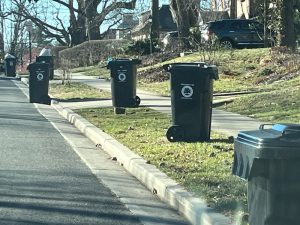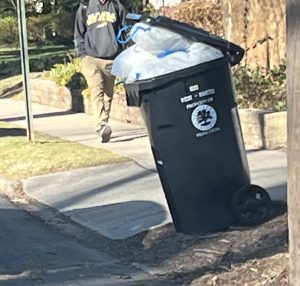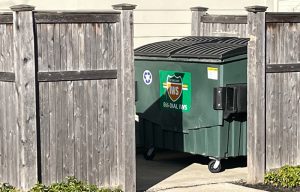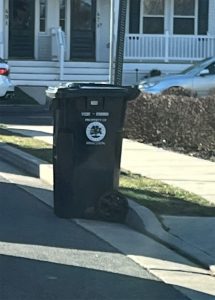 Garbage is dirty by nature. And Princeton’s recent change to a new trash system is certainly getting grimy, with some residents voicing anger over everything from the single 64-gallon trash cans for all to costs for additional barrels and more. To delve a little deeper, Princeton Perspectives asked Councilmember Eve Niedergang, who is a member of the municipal Infrastructure and Operations Committee, to respond to concerns and thoughts residents have shared with us.
Garbage is dirty by nature. And Princeton’s recent change to a new trash system is certainly getting grimy, with some residents voicing anger over everything from the single 64-gallon trash cans for all to costs for additional barrels and more. To delve a little deeper, Princeton Perspectives asked Councilmember Eve Niedergang, who is a member of the municipal Infrastructure and Operations Committee, to respond to concerns and thoughts residents have shared with us.
Concern: We’ve heard the rationale – that there are few choices now in trash haulers and the costs have gone up drastically. It’s said the alternative choices for Princeton would’ve cost taxpayers more. But why did we switch to a whole new trash pick-up system? What’s the previous cost versus the new costs with Interstate Waste Services?
Eve’s Response: Interstate Waste Services acquired the company we used to use for trash. We’re required by law to go out and bid and when we did, we only got 1 bid, from them. It’s not 100% clear why we’re only getting one bid. There are definitely some issues of consolidation in the industry and also, they are having trouble finding staff. This system enables one person to do the job with a much lower injury rate than you’d have otherwise. In the normal pre-COVID world, it would be a concern that this eliminates jobs, but this will actually allow these companies to survive. We worked with a waste consultant, Wayne Defeo, one of the premiere people in the state on recycling/waste issues, and he knew the old way we ran trash pickup would be more expensive. So, our bid request was only with the new trucks/bins. We had some ideas based on what other municipalities were seeing with 70-100% increases. This bid came in just about 50% higher than our old contract, even with the things we introduced.
Concern: How about consolidating with neighboring towns to force these haulers to lower prices and make trash removal more affordable for municipalities?
Eve’s Response: No, we didn’t actively consider it. We share a facility in Lawrence where we take our leaves and brush, and it’s really complicated. Plus, their trash contract doesn’t expire until 2024 or 2025, so what are the chances to find a neighboring town whose contract ends at the same time? We signed a several year contract, so it’s going to be a while before we’re looking, but it is something I’d definitely consider exploring with the new county executive, to have multi-town hauling to achieve some better cost control.
 Concern: Taxpayers pay for trash removal as part of their municipal taxes and Princeton has the highest taxes around. One resident said this feels like a form of socialism – as everyone has the same size bin, no matter their circumstances. How do you explain that 1–4-unit dwellings or homes with numerous children have the same size container as single person households?
Concern: Taxpayers pay for trash removal as part of their municipal taxes and Princeton has the highest taxes around. One resident said this feels like a form of socialism – as everyone has the same size bin, no matter their circumstances. How do you explain that 1–4-unit dwellings or homes with numerous children have the same size container as single person households?
Eve’s Response: Infrastructure and Operations did crunch the numbers and very few households in town generate more than what would fit in a 64-gallon can. There are some, but it’s not a lot. This was another effort again to contain costs. Our waste consultant encouraged this, thinking it provides an incentive for people to think about what they’re buying or getting rid of. We have a financial assistance program for people for whom a 2nd bin would be a hardship. I know things comes wrapped, you can’t always control it, but it’s a cost control measure. Every municipality makes a decision about what it offers to residents and what it doesn’t. Montgomery and Hopewell don’t offer any trash pickup. I understand people being upset, as residents are paying a lot of taxes, but the municipality could’ve decided to not have trash service at all. We have to be guardians for all people.
Concern: Lawrence has 95-gallon carts, and each additional is a 1-time lease of $45 or $55. That, compared to Princeton’s 64-gallon bins and charging up to $300/year for a 2nd can, if needed? Can the town work with the can supplier or order in bulk to lower that price?
Eve’s Response: Lawrence will be renegotiating their contract soon and let’s stay tuned, they’re going to have to make some of the same choices. We thought about a 95-gallon cart, but some seniors are complaining the 64 is too hard to maneuver. 95 seemed unnecessary for the vast majority of households. If you are using a 2nd can, those are costs the municipality has to bear. A full 2nd can would cost us about $600/yr. So, we halved that amount and we have to pass that on. Ordering in bulk wouldn’t offset the costs, because it’s not the can, it’s the weight of the garbage.
 Concern: What if a resident has several additional bags of trash from hosting a party? Cleaning out the basement? Wrappings from new purchases? How are they supposed to get rid of them? People are talking about putting trash in other places. Are they going to use dumpsters at large complexes? Top off a neighbor’s emptier bin? What’s the alternative?
Concern: What if a resident has several additional bags of trash from hosting a party? Cleaning out the basement? Wrappings from new purchases? How are they supposed to get rid of them? People are talking about putting trash in other places. Are they going to use dumpsters at large complexes? Top off a neighbor’s emptier bin? What’s the alternative?
Eve’s Response: We have no official policy for an alternative. If there’s no food in them, perhaps you can store them for a week. I’d ask some neighbors if they had room. I’d be willing to let my neighbors put their trash in my bin. I think most people would be willing to help a neighbor out on occasion. If you’re truly generating more trash than 2 64-gallon containers all the time, you’ll have to find a dump willing to accept that. That’s not something we’ve looked into. If it turns out a lot of people have that problem, we’ll have to look at it.
Concern: RFID tags are tracking devices on each cart? It makes sense so they don’t get lost, but how do you explain that to residents that feel government is watching?
Eve’s Response: It’s not to track people, it’s not a GPS, it’s a radio frequency identification tag with a narrow range of a few hundred feet. The tag is really so that if somebody takes your cart and it’s not at your house, we know that and can provide a replacement. Since we’re charging for extra carts, it creates incentive to take one from someone else, so it enables us to track that the carts are at the right house. It’s a very limited system which is pretty standard in these types of carts.
Concern: With the addition of the new, town-required cans, people are throwing away their old large plastic trash cans. It is so wasteful both financially (as people bought them) and environmentally. How does an environmentally and cost-conscious town like Princeton allow for this?
Eve’s Response: That was definitely a concern. We are hoping people participate in some of the things we’ve outlined, and Sustainable Princeton has come up with uses for existing trash cans such as collecting yard waste, composting, using them as rain barrels. Once they get picked up from peoples’ houses, we’ve had landscapers express an interest in having some of them. People have also put out notices on social media such as Freecycle and Buy Nothing where people can pass them along to someone in a neighboring town to continue using them. We’re not happy about the environmental burden but there was no other way to move forward with these initiatives other than replacing the cans. We hope people that are willing to put in a little time or effort to reuse or pass along their old cans.
 Concern: What’s the right way to place your can?
Concern: What’s the right way to place your can?
Eve’s Response: Ideally, if you’re on a street wide enough to not cause traffic issues, you should place it with the wheels against the curb with the metal bar facing out. If it’s going to cause problems with others drivers or parking, place the bin where you normally would, with the wheels towards house, and the metal bar facing out. Right now, workers are manually picking up all cans because the new trucks aren’t ready. But soon we will need the cans facing the right way for the tipper arm. If, however, you live on a narrow street like Bank Street, we’ll just continue to use regular crews on those streets.
Concern: You’ve mentioned this new system creates incentives for residents to reduce the amount of trash they generate by reducing, reusing, recycling, and composting. Mercer County only accepts #1 and #2 for recycling, so the rest is trash. Composting is not an option for most homeowners. What is Princeton doing to better allows for these options and educate locals?
Eve’s Response: We and Sustainable Princeton have been doing some educational outreach. It is really hard to get people’s attention. We reached out to local newspaper and, everybody got a flyer with the new trash information which suggested ways to reuse old trash cans, and there’s stuff on our website. We can always do better and we’re learning every day, but this is a new reality. There’s no more place to send stuff, we used to send stuff to China and that stopped. As a society we need to change and as a government we need to use our tax dollars wisely. So, it’s going to be a learning curve for everyone to figure out. Long term, I’d like Mercer County to start taking #5 recyclables as well. I’d like to see industries responsible for the amount of packaging they generate. We are asked to fix the problems that occur much further upstream from us. And residents bear the burden. I’m not saying these solutions are perfect, but we couldn’t go forward with a doubling of our hauling costs. We’ll continue to hear and listen if there are things we can do to address needs and concerns people have raised.
If you have a policy concern, you can reach out directly to Eve by emailing her at eniedergang@princetonnj.gov. If you have a logistical concern about your trash can or pick-up, you can email the waste team directly at wasteinfo@princetonnj.gov.

Lisa Jacknow spent years working in national and local news in and around New York City before moving to Princeton. Working as both a TV producer and news reporter, Lisa came to this area to focus on the local news of Mercer County at WZBN-TV. In recent years, she got immersed in the Princeton community by serving leadership roles at local schools in addition to volunteering for other local non-profits. In her free time, Lisa loves to spend time with her family, play tennis, sing and play the piano. A graduate of the S. I. Newhouse School of Public Communications at Syracuse University, Lisa was raised just north of Boston, Massachusetts but has lived in the tri-state area since college. She is excited to be Editor and head writer for Princeton Perspectives!
